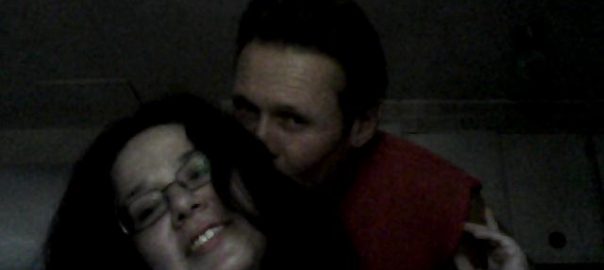Memory Loss
by Sara Marchant
I am sitting on the bumper of my husband’s truck, waiting for him to finish his post-lunch cigarette and let me in the vehicle, when a luxury SUV stops next to me and an older Japanese lady puts her head out the open window and hails me. She hails me by name. It is summertime in Southern California and I am in an asphalt scented parking lot, choking on second hand smoke, overly full of turkey burger– surely I’m hallucinating this stranger calling my name.
“Sara!” She calls again, despite being two feet away from me. “Isn’t that you?”
“Yes,” I say, looking around. I am the only person, except for my husband who has retreated further under the shade of a straggly tree to avoid detection, who she could possibly be addressing.
“You are Sara, right?” She has noticed my confusion.
I admit that I am. My husband, using my distraction to take advantage, lights another cigarette. “Do I know you?” I finally ask.
It is entirely possible that I do know her. Or did know her prior to 2003 when I suffered a traumatic brain injury in a car crash. This has happened before. A woman came up to me in public and chatted, naming several friends we had in common. I played along, not wanting to let on that my faulty brain had erased her from my memory. A phone call later that day to one of the friends mentioned revealed that while not close, this erased woman had been a friend. We attended events together, went dancing. She had told me about her abortion, our mutual friend reminded me, and I cried with her. I cannot remember her at all.
“Yes! Sara!” This lady exclaims. “We used to be next door neighbors in Alameda. Alameda, California? You and your husband, Steven?”
I take a breath, relieved. I don’t even know where Alameda is, let alone recall having lived there. “Oh, sorry,” I say brightly. “My name is Sara, but that’s the only husband I’ve ever had.” I point and my husband (not named Steven) salutes her with a head nod and a wave from the hand holding his cigarette.
She does a double take and then looks extremely doubtful. “Oh,” she says as if that means something. “Oh, I am sorry.” She looks at my husband again, then back at me. She looks like she’s about to say more, but instead drives away.
“That was weird,” I say as my husband throws down his unfinished cigarette and finally lets me into his truck.
“She didn’t believe you,” he tells me. “She thinks you are the same Sara who lived next door to her and you’ve never told me about your other husband, Steven.” He is driving as he says this, calm, but still smiling. My shock pleases him.
“I have to call my mom,” I say, and do so.
“That’s ridiculous,” my mom replies when I ask her if I’ve forgotten another husband, another marriage, an entirely different life in an unknown town. “Of course you’ve never been married before, and where is Alameda, anyway?”
Her annoyance is so everyday normal I am relieved, and get off the phone. My husband doesn’t know how my stomach tightens each time a forgotten person re-enters my life, how my heart seems to gush with liquid for a shattering moment, and saliva fills my mouth in panic.
Have you ever lost your purse or misplaced your car keys in public? For a few heartbeats your world stops– and then starts again when you remember the purse is hooked on the back of the restaurant chair or your keys are in your other pocket. Imagine your purse is your brain, your car keys are chunks of your life. Pieces of me are gone and, as far as I know, they aren’t coming back.
It is a hot, sweaty day but I had goose bumps as I questioned whether there had been an entire life forgotten. It wasn’t me. I wasn’t the Sara who had been married to Steven and lived next door to that nice Japanese lady in Alameda, California. But it could have been.
I could have another life somewhere in Alameda with my husband Steven. Perhaps we have two and a half children and a lakeside cabin we visit on weekends and hobbies we enjoy together. Maybe Steven is a rich orphan and I am an only child and we take our beautiful, healthy children out on our speed boat every chance we get. But how could anyone forget a life like that?
In the years to come, Steven, my ‘other husband,’ will become a third presence in my marriage. My husband will use him as a scapegoat. Mud tracked into the clean house? That was Steven. Who ate an entire chicken meant to feed the guests at dinner? Obviously, Steven.
I use Steven, my imaginary husband, as a measure against my real husband. Steven always called when he was going to be late. I never had to ask Steven to take out the trash, he just did it. Steven’s parents were nicely dead. Steven didn’t have two ex-wives running around town. Steven didn’t have three grown children from a previous marriage. Steven had healthy sperm.
We are very careful to never mention Steven around my mother. She finds Steven creepy.
____________
Sara Marchant
received her Masters of Fine Arts in Creative Writing & Writing for the Performing Arts from The University of California, Riverside– Palm Desert. Her work has been published by The Manifest-Station, Every Writer’s Resource, Full Grown People, Brilliant Flash Fiction, and The Coachella Review. Her work is forthcoming in the anthology All the Women in my Family Sing. She is the prose editor for the literary magazine Writers Resist.

